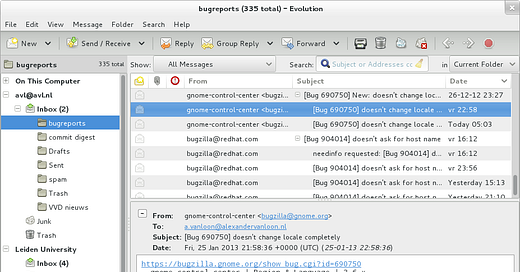19th March 2021. Email | Nature
Email is bad for you; the World Nature Photography Award winners
Welcome to Just Two Things, which I try to publish daily, five days a week. Some links may also appear on my blog from time to time. Links to the main articles are in cross-heads as well as the story.
I think everyone who uses email knows this, but it’s worth spelling it out, as Cal Newport does in a recent article in the New Yorker.
(Image: By AlexanderVanLoon, via Wikipedia, CC BY-SA 3.0.)
In short, there is now a whole raft of research linking email use to unhappiness. Newport references some recent research in California where office workers were fitted with heart rate monitors and recorded their heart rate variability.
“The longer one spends on email in [a given] hour the higher is one’s stress for that hour,” the authors noted.
Responding to email more quickly had some unhelpful side effects, at least in terms of work cultures:
The researchers also found that people answered e-mails more quickly when under stress but with less care—a text-analysis program called Linguistic Inquiry and Word Count revealed that these anxious e-mails were more likely to contain words that expressed anger.
And a large scale 2019 study of Swedish workers who were expected to be always on found their health suffered:
[Researchers] found that repeated exposure to “high information and communication technology demands” (translation: a need to be constantly connected) were associated with “suboptimal” health outcomes.
And one more. A Harvard Business School study found that giving a group of management consultants predictable times away from their emails increased the proportion who wanted to stay at the firm long-term from 40% to 58%—which represents a huge gain in retained knowledge and reduced recruitment costs.
In the article, Newport suggests that the patterns and nature of email are simply fighting with the social nature of human beings:
The sheer volume of communication generated by modern professional e-mail directly conflicts with our ancient social circuits. We’re miserable, in other words, because we’ve accidentally deployed a literally inhumane way to collaborate.
The article—an extract from a book that’s just been published—has got some remedies, mostly about managing flows of work in different ways and reorganising communications. Given the casual way that email has been used for the last quarter of a century, these will have to be intentional behaviours driven by business leaders. Given the wellbeing gains, companies that innovate here first may well get a significant business advantage.
#2: World Nature Photography award-winners
Sometimes an article doesn’t need much copy. The Atlantic has published a dozen or so of the winners of 2020’s World Nature Photography competition, and every last one is stunning. Sadly, I can’t share any of them here because they are copyrighted. But: enjoy.
Update: Uber has partially reclassified its UK drivers as workers following the Supreme Court ruling (but not its Uber Eats workers). But only partially. Expect further legal action.
j2t#060
If you are enjoying Just Two Things, please do send it on to a friend or colleague.



